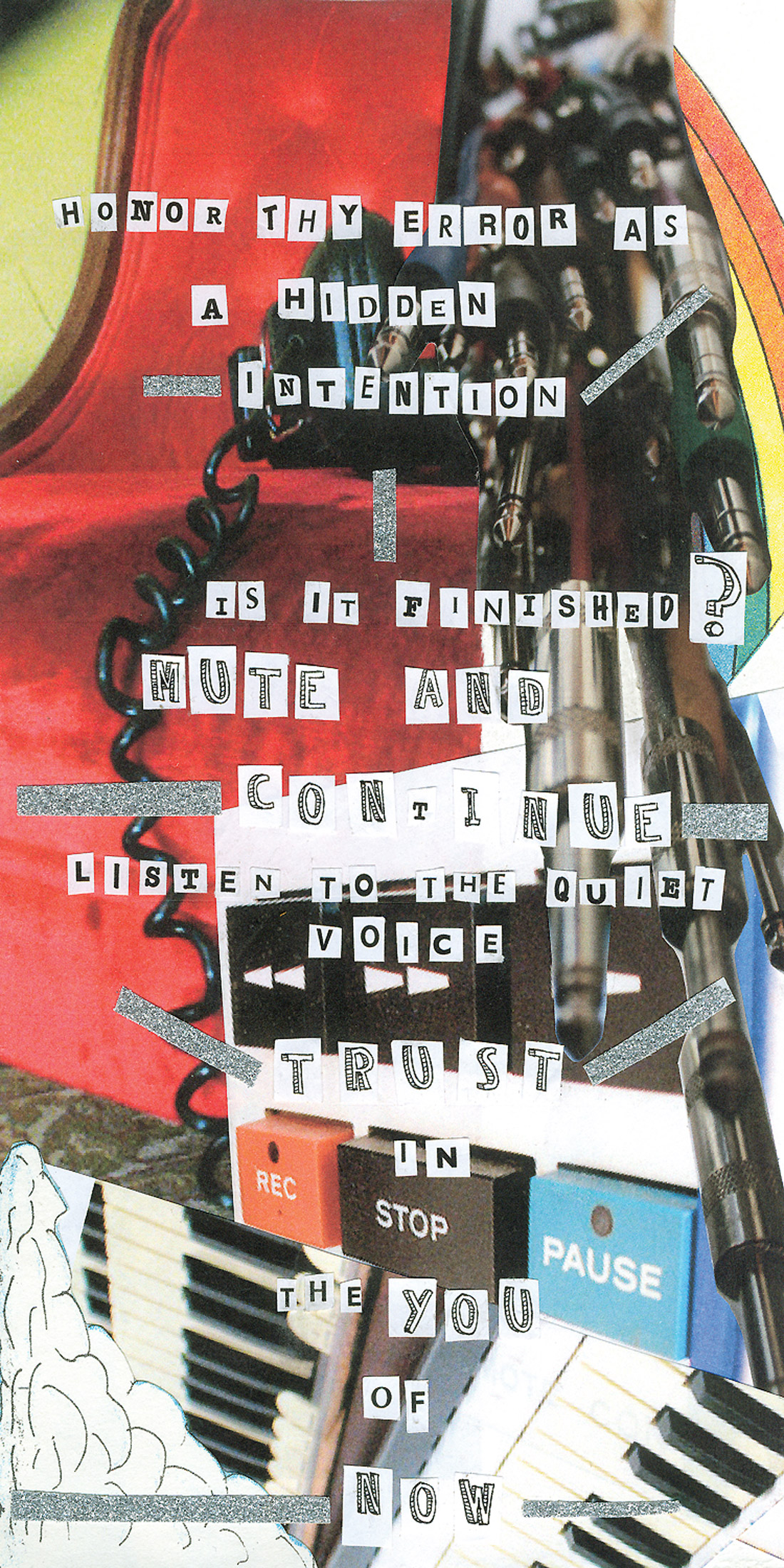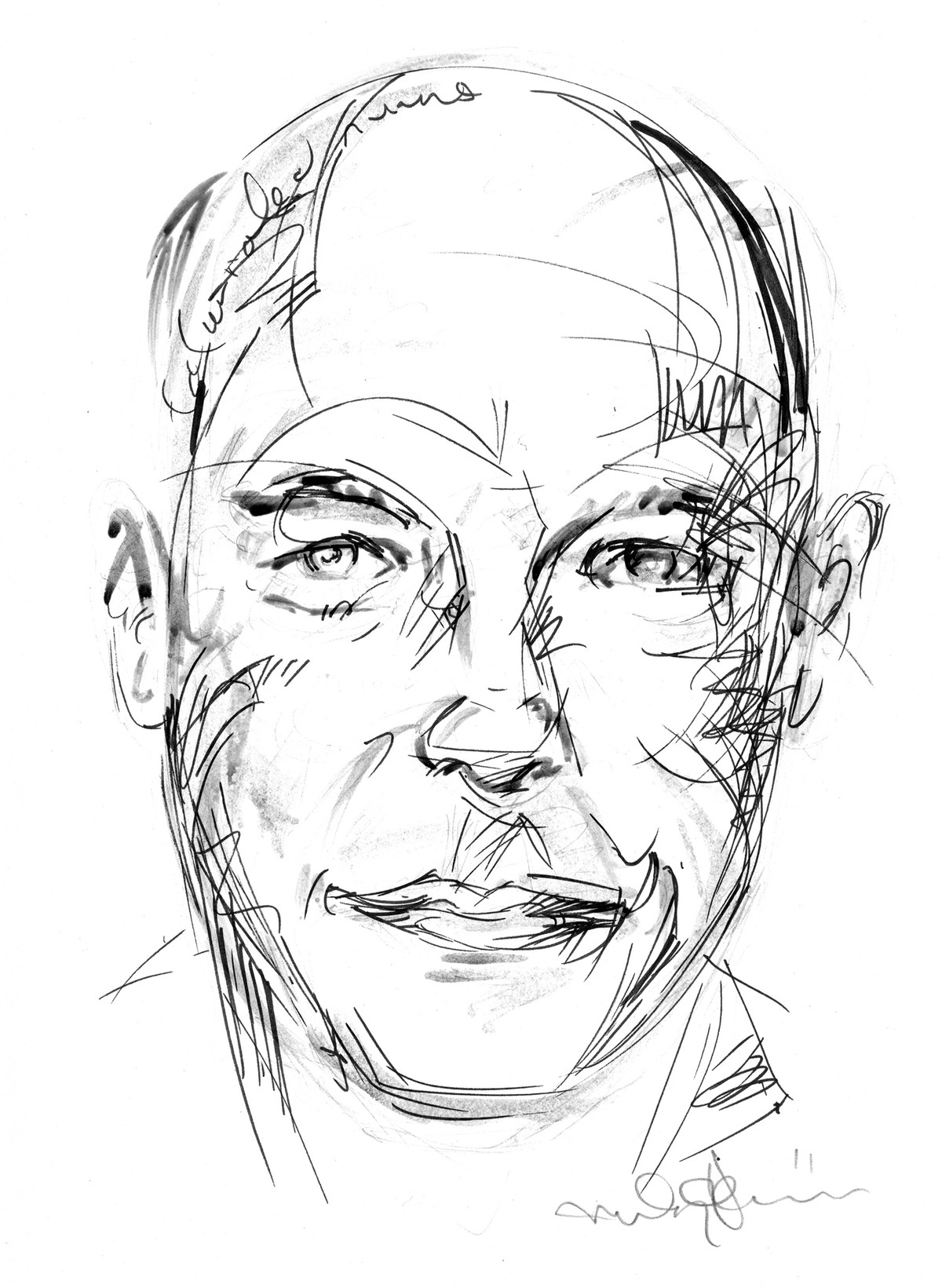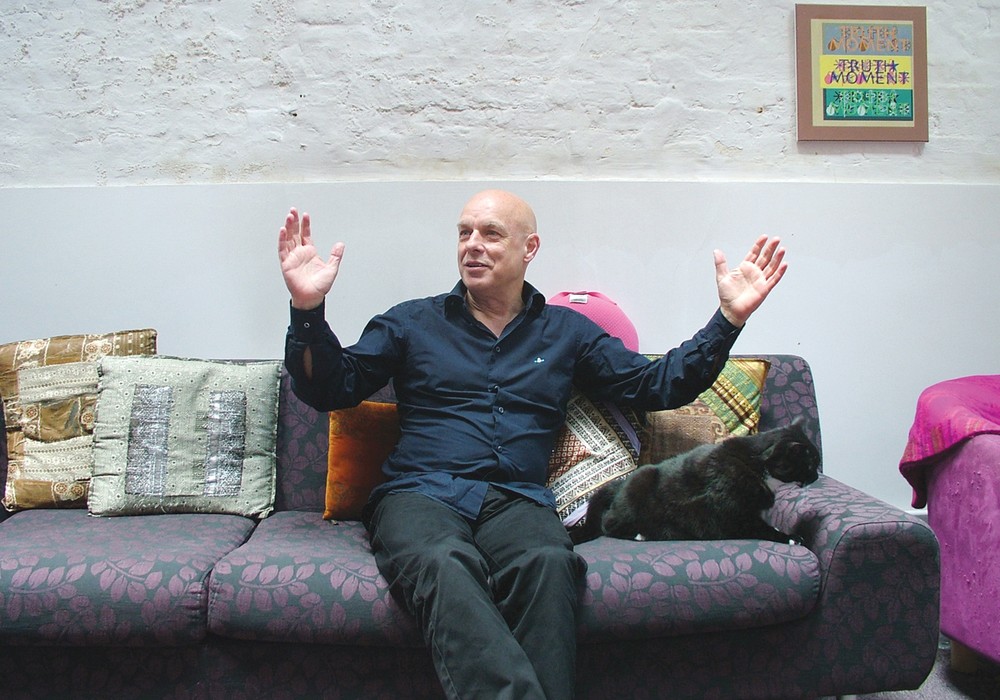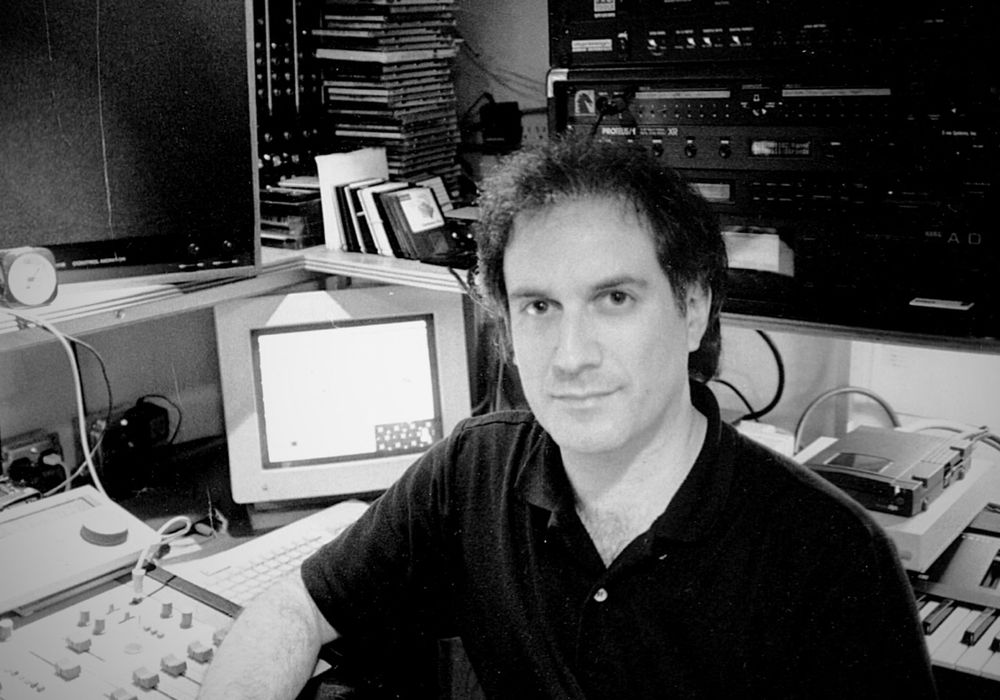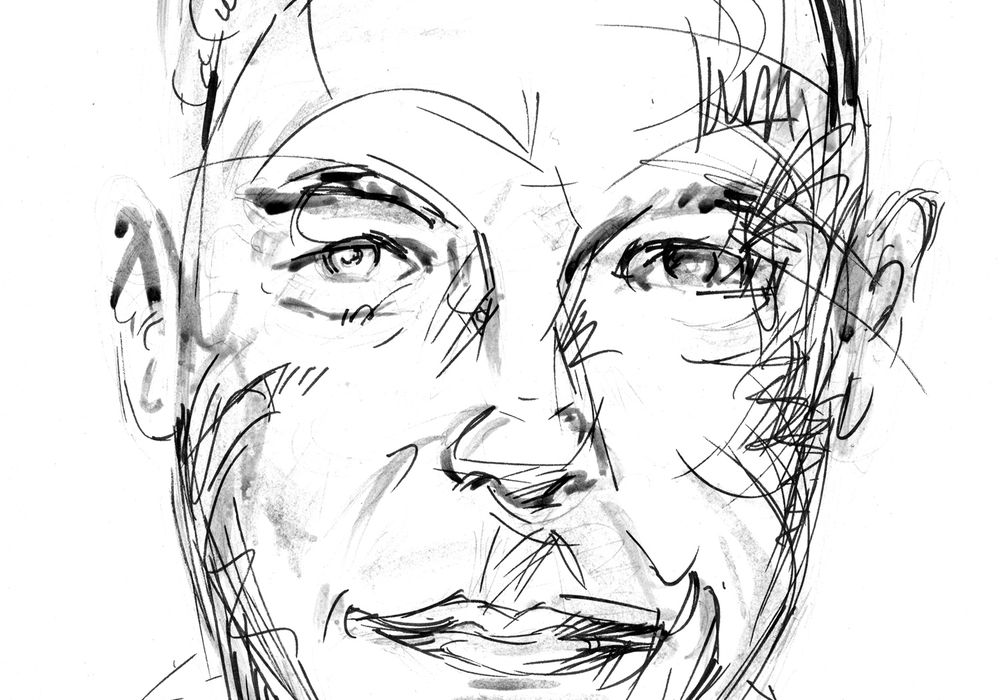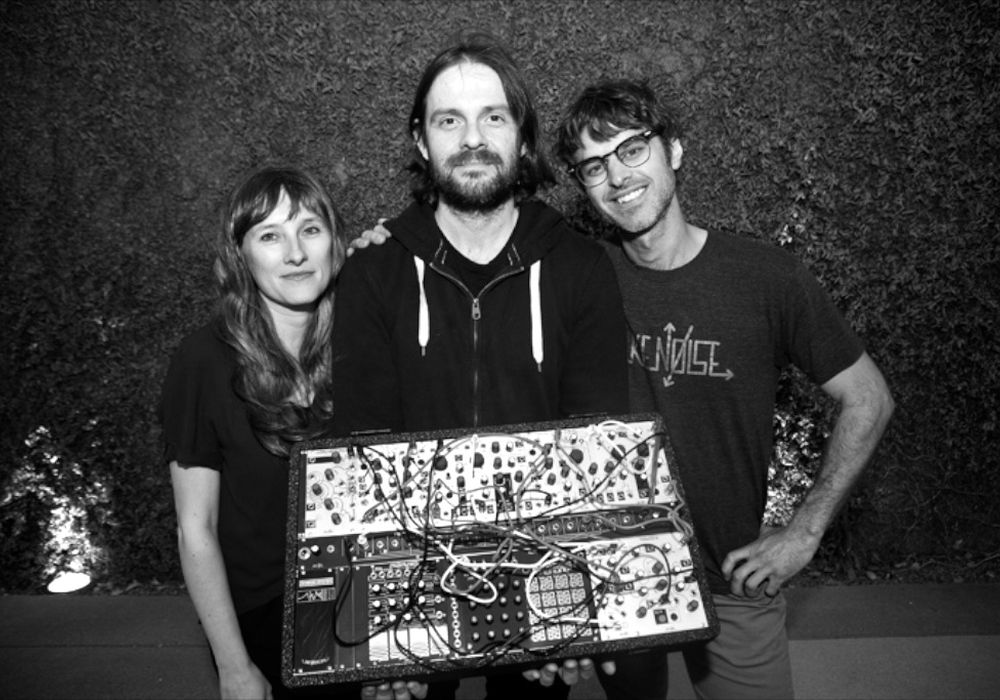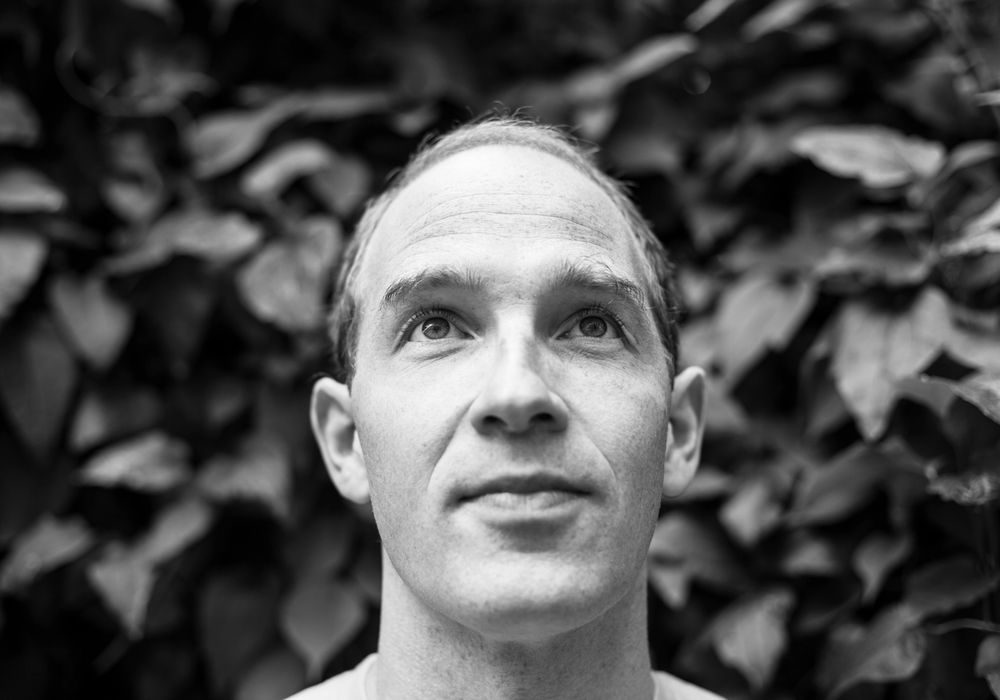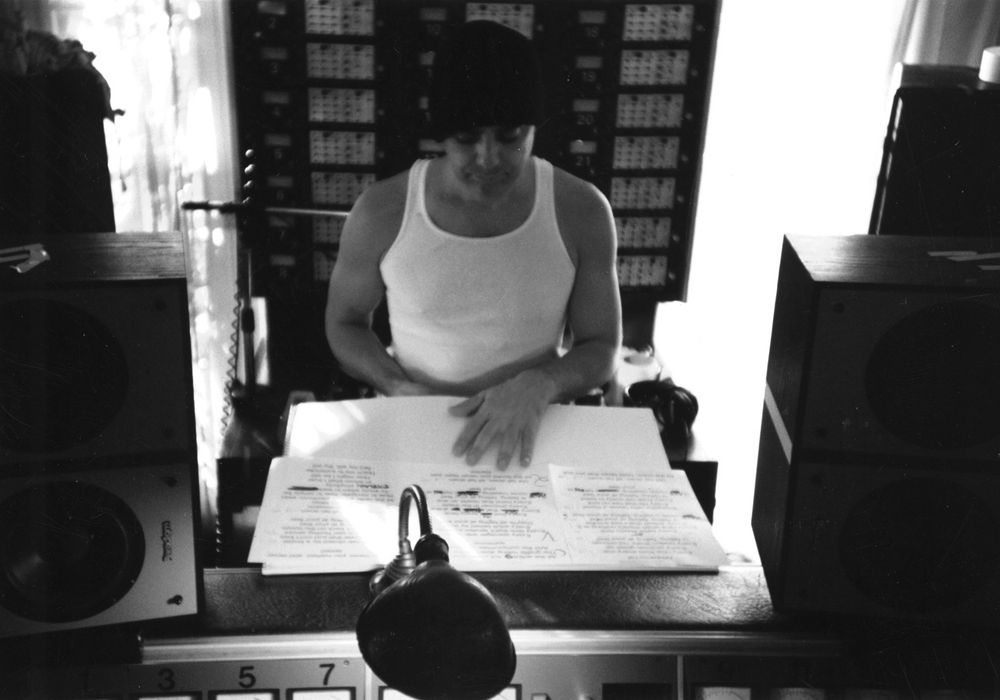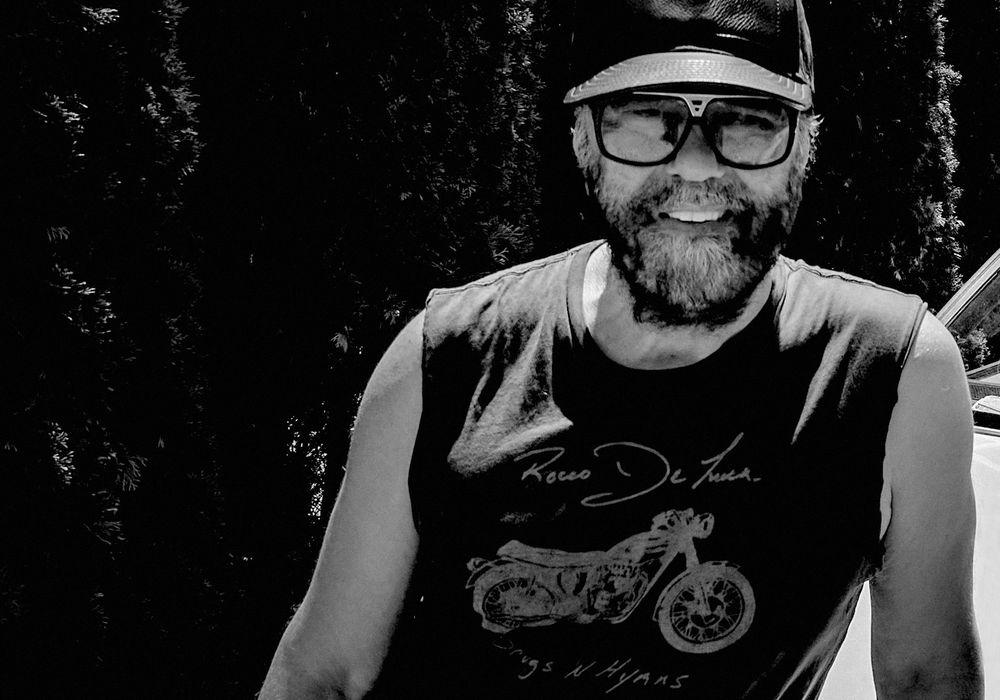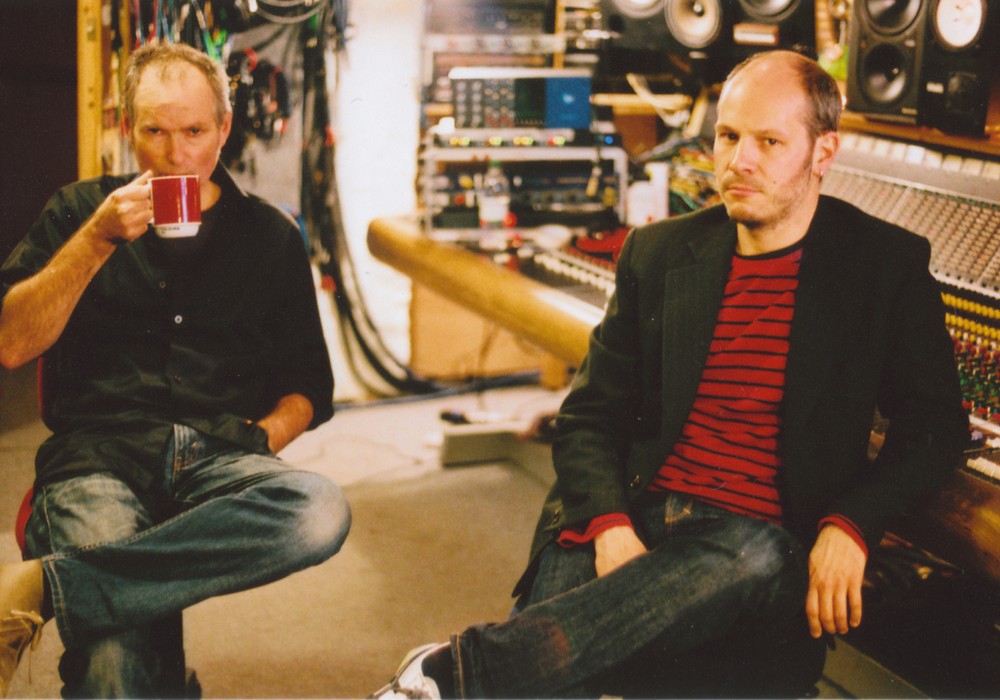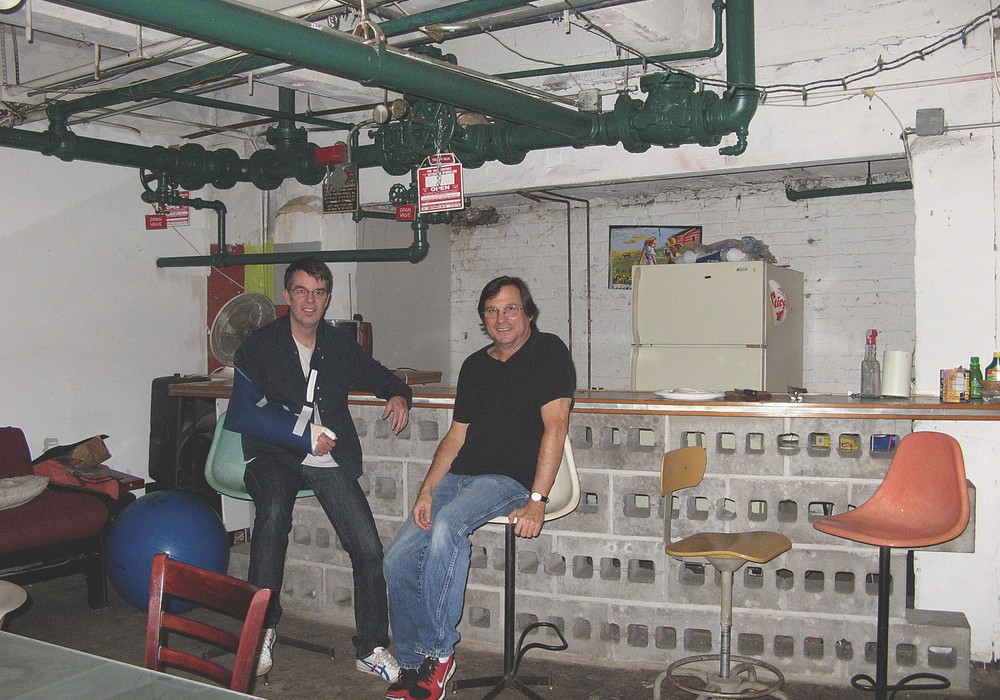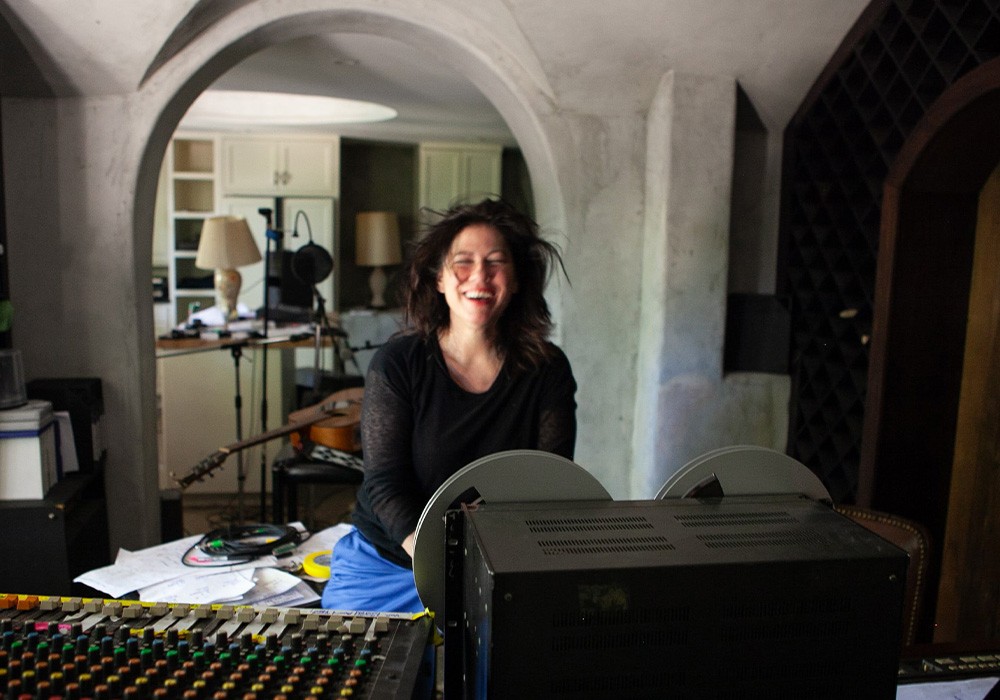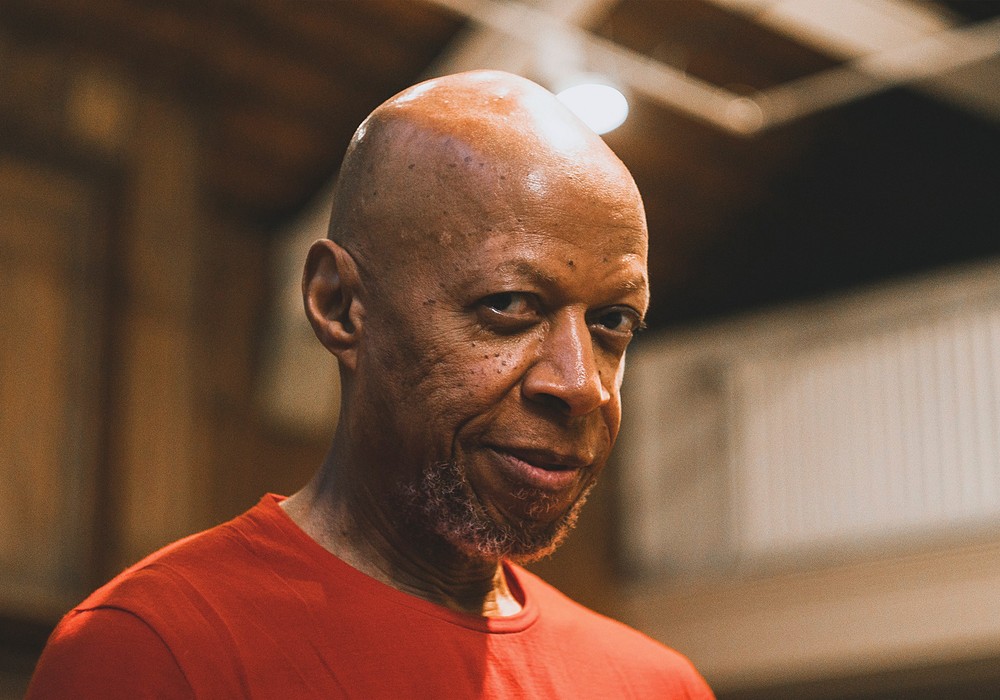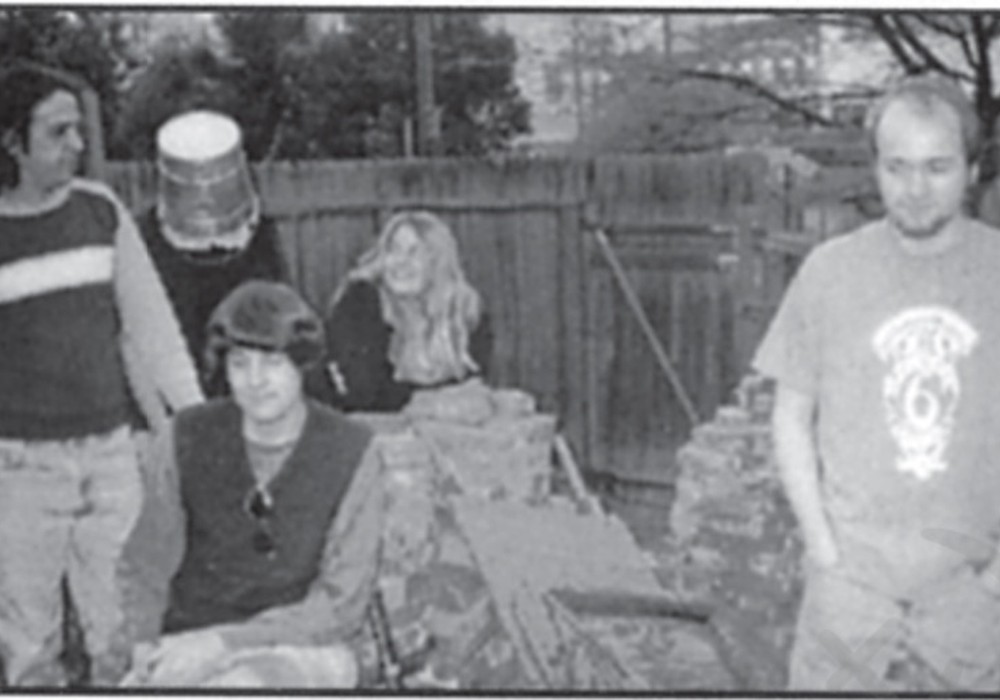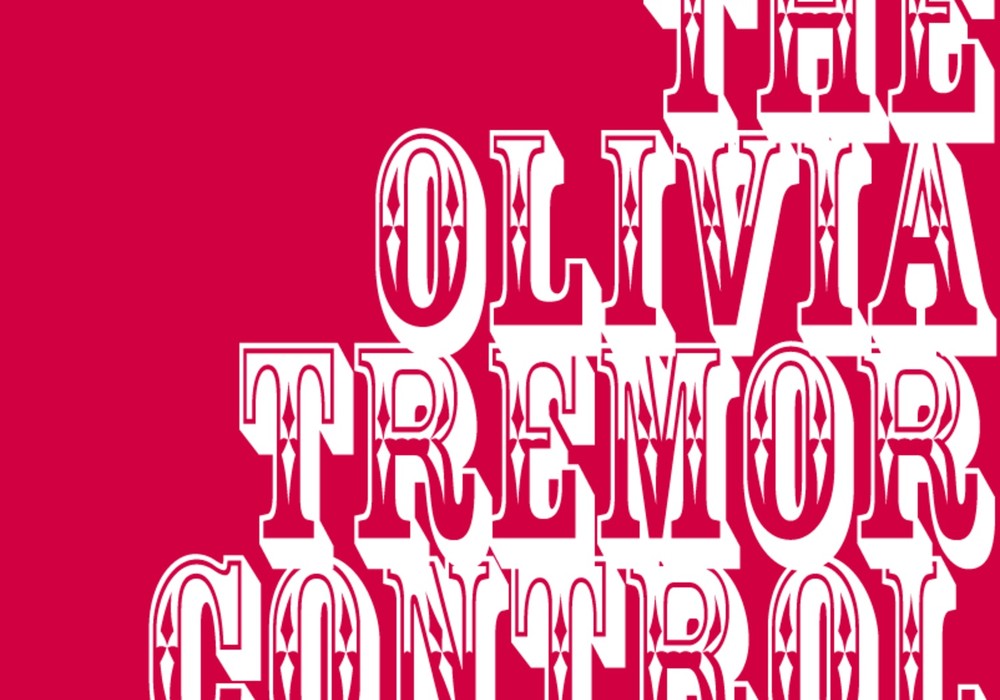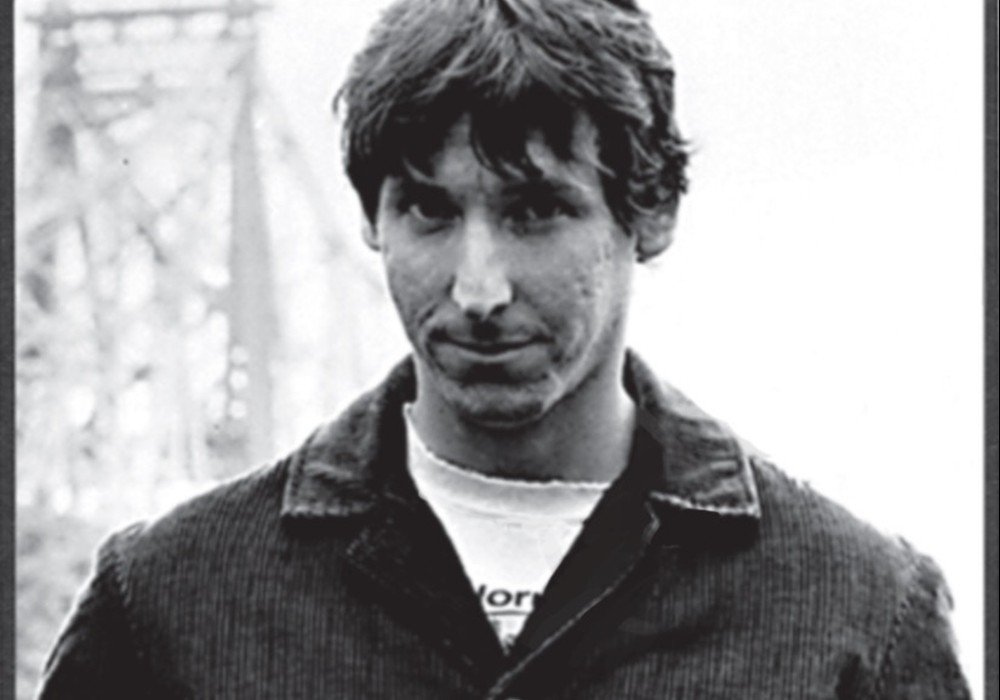With his early years in Roxy Music, arty solo albums in the '70s, the creation and conceptualization of "ambient" music, groundbreaking collaborations with David Bowie and as the producer of albums for Devo, Talking Heads, U2, James and Coldplay, Brian Eno should need no introduction to the readers of this magazine. Most likely no one else has discussed and analyzed the art of capturing music as much as Eno. He's obviously gifted with a constantly active mind.
It has long been a dream of mine to meet this man, as well as ask him questions about music and the art of recording. One recent sunny day in London found John and I walking down a dead end street leading to Eno's workshop near the famed Portobello Road. We waited patiently while paintbrushes were cleaned, cats discussed and tea made; then we sat down for an hour and talked.
I just finished reading David Sheppard's On Some Faraway Beach, the book about you. Do you ever read books about yourself?
I've never read it. I picked it up in a bookshop and read four pages, standing up. And there were four mistakes in it! They weren't very important mistakes; they didn't make any difference to anything. But I thought, "I'm just going to get annoyed if I read this."
Sessions I've worked on have shown up in books about artists. I read these and think, "Nope. That's not what happened."
Well, it's a sort of rule of life that anything you've ever been involved in will not be reported accurately! [laughter] So, a very good way of understanding newspapers and media information in general is to look at a report of something you know about and you'll find there are quite a lot of mistakes. Sometimes they're minor. But sometimes they're quite major and they're a completely different perspective on the event. They may be factually accurate, but they give quite a different feeling from what was going on.
Exactly.
If you imagine that this is probably true of every other article in the newspaper as well... Somebody who knew about it and read it would say the same thing. It's just not what happened.
Right. So, we're here to propagate more mistakes and lies with Tape Op! [laughter]
Well, interviews are different. Though there was a way of even perverting those in the '70s. What interviewers would do was ask you a question. Then they'd print your answer but rewrite the question! That's a very subtle way of changing things. They can make you look like a complete idiot. Your words are exactly the same, so you can't accuse them of misquoting you. But they fall in a different context because the question is different. It makes an entirely different impression. That was a different period of music journalism.
You were collecting tape decks while in college. What was the urge to get devices that could capture and manipulate audio?
First of all, the tape recorder was the first musical tool I could handle. I couldn't play any instruments. And I think I still can't, really, in the strict sense of that word. But I remember, when I was quite young, hearing about tape recorders and thinking how incredible it was that you could capture a sound! That seemed, to me, to be such an amazing idea at the time. I went to bothering my parents for years that that's what I wanted for Christmas, but they were expensive and clunky then. In England, we had these tape recorders called Ferrograph. Ferrous means iron, of course, and they were solid blocks of iron. I subsequently had one, but they were so heavy! I always wanted to get my hands on one of those. The first art college I was at had a tape recorder and I just took it over. It became my plaything! I started really exploring the plasticity of sound. The fact that, as soon as sound is not just something in the air but on tape, it's a plastic material. It's malleable, like paint is. It all seemed completely consistent somehow that the material I was working with instead of color was sound. I remember the very first piece I made, which is not very different from a lot of the music I still make now. It hasn't really progressed a whole lot. [laughter] We had a one of those institutional circular lampshades. When struck, it had a very beautiful note. The recorder had three speeds, so I multitracked it at different speeds. It was something like a Revox where you can jump from one track to the next. So, you put track one over to track two with the new additional sound on sound. It was very similar to ambient music I've done since. It was this long, slow gong sounds in three octaves.
Right. I was going to say the speeds would be in octaves.
Right. The deeper sound was so awesome at quarter speed. It was just, "Wow! This is fantastic." I'd never heard anything like it. I still didn't own a tape recorder. Then I saw someone selling one in the newspaper for not very much money, so I bought it. It was in quite bad repair. But that meant it could something that no other instrument could do. The spindle that drove the tape was a bit wobbly, which meant everything went like that [makes wobbling gesture]. I thought, "Wow, that's good!" [laughter]
It was accidental manipulation. Did you find subsequent ones that had other anomalies?
Yes, lots of interesting anomalies. For instance, I used one as a tape echo device. There must have been something wrong about the way the bias was set because it would immediately take it all to high frequencies. Again, you see, this was before... There weren't other ways of doing those things. There weren't processing tools. This was in 1967 or '68. Not many things like that existed.
Plate reverbs and such?
I wasn't part of the pop world where there might have been things like that. I hadn't joined a band yet... At the time, were you aware of
[Karlheinz] Stockhausen and tape manipulation and things like that?
Yes. That was the area I was coming from, so I knew about that. Of course I was enjoying pop music, but I didn't really know anything about the technology of it at that time. But I did know about experimental music. In fact, my professor was Tom Phillips, who was a painter but had very close connections with the experimental music world. Through him I got to meet Morton Feldman and Christian Wolff. I subsequently met and worked with Cornelius Cardew, who's a very important composer here in England. He started this thing called Scratch Orchestra, which was an experimental commune of mostly art students who began doing really interesting things musically. They were very, very far ahead of their time, in some respects. The English school of experimental composers — which included Cardew, Michael Nyman, Gavin Bryars and Christopher Hobbs — were anti- electronic. So the electronic people were the Europeans; Stockhausen and his IRCAM [Institut de Recherche et Coordination Acoustique/Musique] were just starting to form then. There were actually three camps. There were the Europeans, who were consciously carrying on the tradition of classical music. They saw their route as serialism — [Arnold] Schoenberg, [Alban] Berg and [Benjamin] Britten. They saw logical steps into what they were doing. Then there were the Americans. There was [John] Cage, of course, at the top it. [Morton] Feldman, Steve Reich [Tape Op 15], Philip Glass and Terry Riley; they stepped out of that tradition completely. They didn't see themselves as the logical next step in the European classical tradition. They were really something different and looked much more interesting to me. But then there was the English school as well, which was different from either of those in the sense that it was very conceptual, very homemade and nothing to do with electronics. Electronics were slightly a "cheap trick." [laughter] I felt really at home between what was going on in America with the "California Minimalists," as they were then called, and what was going on in England. My idea became to consolidate those two things. Gradually, I started realizing that a lot of the things I was interested in about pop music, as it was called, such as The Velvet Underground, weren't actually irreconcilable with that. I'd thought they were irreconcilable. It seemed to me they were really different ways of thinking about music, and I couldn't, for a long time, see any way in which they could be brought together; but then I did.
I know you had a few bands, or combinations of people playing, during your college years. But there's always a gray area in my mind as to the transition from the art world to ending up in Roxy Music. I know there was a bit of happenstance as to how you ended up in that band...
Yes. I think there are two things going on here. First of all, by the late-'60s, multitrack recording was commonplace. It was still 8- to 16-track then. I think it was still 8-track, actually! But a new idea had appeared, which was that music could be a lot like painting instead of being something where you stood in front of a mic and performed. Essentially it was all made in one moment — one time, one place; which is what was happening with traditional recording at the time. Even if engineers and producers tarted it up a little bit, was essentially a record of performance. But, by the late '60s, there'd been the history of Phil Spector and, of course, George Martin as well as various other people. They were starting to realize that what you did in the studio was a painting. It was painting with sound. You could make a piece over an extended period of time — it didn't have to preexist the process; you could make it up as you went. And you could make it like you would a painting — you could put something on, scrape something else off. It stopped being something that was located at one moment in time. It started being a process that you could engage in over months, or even years. You could come back, change it 'round and cut and paste. Funny enough, the people who first realized this were art students. That's why I'm convinced there was such an influx of art students into music in the late '60s and '70s. It was because we were better equipped to know how to use the medium than musicians were. Musicians, of course — because that's where their talents were — were still thinking of performance. Music students in particular were way behind the curve. They didn't get it at all! If you look at bands from the late'60s and '70s, you'll find lots of art students and no music students in them.
Exactly.
Almost without exception the music students didn't get that idea.
Well, Pete Townshend, whom I know you admire, is a perfect example of that.
Exactly. We studied under the same people, Pete and I. There was this fact that the medium had changed. It had inherited the same name — music — but it wasn't the same medium. Just like cinema isn't the same medium as theater. It invited in a whole lot of new talents, which happened to come from the visual arts. Really, that these people came from outside music is the important thing. The second thing is by the late '60s and early '70s, you have to remember that this was the era of pop art in the fine arts. The probable godfather of pop art was an English painter called Richard Hamilton; he was on it before [Andy] Warhol or anybody else. He was really one of the major figures in the idea that one could use popular iconography and take it seriously. Bryan [Ferry], the founder of Roxy Music, had studied under Richard Hamilton at University of Newcastle and I had studied under Roy Ascott, who was Hamilton's protégé at Ipswich. We'd both come out of this background of a fine art world that had turned its attention to pop and said, "Ah, there's something interesting going on there!" It's not the little brother that trickled down. It's not the debased form of what fine artists were doing. We both had this idea that there was a new medium and that it was the medium we wanted to be artists in. I don't think we ever felt that we were ever stepping down from the lofty ideals of fine art just so we could pull some attractive chicks, or something like that! [laughter] Both of us felt that this was where we were going to be artists. It was quite self-conscious, in that way.
Do you think it was more like conceptualizing what Roxy Music could be, as opposed to four guys getting in a room and just banging out songs?
No, it wasn't at all like that. We were very conscious of where we could stand in the history of pop music, which was approximately 16 years old at the time. Also, we felt we could use anything that had happened in that history as our palette. We weren't at all embarrassed about taking the stage style of Little Richard and adding it to a completely different kind of music. That's what we thought we were doing. It was a collage of pop music to that point. There are always a lot of those "sincerests" in art, who distrust intellect and think that it necessarily dilutes and ruins serious, passionate art. Well, they didn't like Roxy Music. They saw it as much too intellectual, really. In fact, funnily enough, yesterday I received a doctorate from my old art school.
Oh, really?
I'm now a Doctor of Letters, whatever that means. The person who read my oration had gone through some internal documents of the art school I'd been at and he found one document from a member of staff to another that said, "Eno is hampered by intellectual considerations." [laughter]
And you still must be!
It's interesting that there's always that problem in art. People think you've got to keep it away from the brain.
We could go forever about that one! When was the first time you stepped into a commercial recording studio?
I was performing in the Scratch Orchestra. We recorded a portion of Cornelius Cardew's composition called The Great Learning, which is this enormous, very ambitious work written for non-musicians. There was a part in The Great Learning called "Paragraph 7." That was a piece I became very, very interested in and I wrote a lot about it.
So, that was the first time in the studio?
Yes, but I wasn't involved at all. I didn't even go in the control room, actually. We just went into this great big studio and did it.
Where was that?
I think it was a studio called Chappell. It was a classical studio, really. Just the other day I found a CD of it in a secondhand shop! I was very, very pleased to find it because I had the record for years.
What were your impressions of that experience?
I didn't really pay much attention to the studio, because I wasn't aware of it. We were just in a big room. I think it was very simply recorded, maybe just two mics or something. The first time I went into a studio with intention of making something was the first Roxy Music album. We went into a studio called Command Studios in Piccadilly, which is a great part of London. It's right in the center. I used to love the lunchtimes; I'd go out for a walk. Bryan and I used to smoke Sullivan Powell Turkish cigarettes that you could get in the Burlington Arcade. Records were made so much more quickly then. I already had some idea, not only of how studios worked, but what I thought was possible in them that hadn't been done before. We did a little bit of experimenting on that record.
Does some of that have to do with processing things through the synthesizer?
We're talking such a long time ago, to sustain my interest in talking about it is already proving challenging! [laughter] I'm really not all that interested in that era. It was primitive — and it was 44 years ago!
That's true! One of the things that comes up is people throwing your name around as "Eno-esque."
It's quite nice being an adjective! [laughter]
Do you find it interesting when you see reference to it pop up?
Yes. Well, it's a little bit like we were saying earlier. Sometimes I think, "This isn't Eno-esque at all!" [laughter] Not the Eno I know, anyway! But it's the same when ambient became a word. I'd been using it since the late '70s, but it wasn't until the early '90s that it became a word that people started using [regularly in regards to music]. Then there would be these sections in record shops called "Ambient!" I'd look through and think, "No, no, no." It very quickly morphed into something different than I thought it was, which is fine. One doesn't own concepts like this!
Right. Stuff showed up later in the '90s that had a defined beat, which always baffled me; especially coming from your view of ambient that things are more in a floating state. I'd hear this, "Boom! Boom! Boom!" and think, "Really?"
Yes, it meant "slightly quieter kick drum!" [laughter]
That always confused the shit out of me.
Me too.
John and I work as producers and at times, for me, it's a financial necessity to work in the studio — to keep my studio and my career alive. I imagine you don't have to worry too much about your finances on that end, but what are considerations that make you take on a U2 or Coldplay album these days?
There are quite a few of them that mesh together. But the dominant one is, "Am I likely to go somewhere with this that I haven't been before?" Or, "Am I likely to take the little bundle of ideas that I nurture and plop them like seeds into some other soil and see them flourish in new ways?" Now, flourish means two things — it means either have babies with other ideas or worldwide successful ideas. One of them is a flourishing in quality and the other in quantity. As you know, I've done a number of things that are quite obscure, as well as a lot of things that are very well known. The obscure things are generally just as important to me, because I like planting some of those things and watching how they diffuse through the culture as well as what they become over time, and then picking them up again. It's like having a little incubator. Put the idea there, see what happens to it — then I'll take it back later and work on it some more. It's like a nursery — you let someone else grow them for a little while! Then you can readopt them after they've been somewhere that you probably wouldn't have taken them yourself. That's the interesting thing about ambient, for example. That's actually a very good example. Suddenly that idea mated with a lot of quite unlikely partners. I wouldn't have imagined it. For instance, the ambient that you were just talking about is the marriage of my type of ambient and techno. I would never have thought of that — but I'm glad somebody did because the progeny of the combination has produced a lot of really interesting music, I think. It's become part of the vocabulary of things that you can do.
Right, true.
So, that's one way of watching your ideas take root where they get married with lots of other ideas. Another way is putting them with a very big band and seeing them suddenly everywhere. That's quite thrilling too!
Do you feel like you've seen that with something like Talking Heads or U2?
Yes. I don't want to give the impression that I'm a sort of Svengali character where these poor, unsuspecting bands become the hosts for my parasitic ideas! [laughter] It's not like that at all. But those bands choose to work with me because they like to work with someone who encourages the new things they want to do, rather than the things they have done. You have to remember that most producers, and most record companies, are thrilled by repetition. You've done one thing that they thought was good, or became a hit, and they really would love for you to carry on doing exactly that for the rest of your fucking life!
John: Until it stops selling!
Yes, exactly. I find with most bands, they are so thrilled when somebody comes along and says, "Wow, I've never heard that idea before. Let's work on that!" And they think, "Really? You mean you don't want another of those types of songs?" I know they can do that in their sleep. I want to know what the other thing is. Most people don't realize that new ideas are clumsy. They're clumsy, awkward and covered in blood. They need a little while to grow; and they need to be protected while they're growing. I think if you're prepared to go through that process with someone, they're very grateful. People really need that help. They need somebody to be engaged. What I give people, as a producer, is that I'm very highly opinionated. When I was in art college, I found that the most important tutors to me were not necessarily the ones I agreed with, but the ones who had strong opinions. The most useless tutors, even if I really liked them as people, were the ones that give no feedback. "Oh, that's quite nice." That doesn't help you at all! The ones who say, "Jesus! That's amazing! You've got to get that finished. Don't fuck it up, get it done!" That intensity makes you think, "Fucking hell, I'd better do something!" Or the person who comes in and says, "That's no good, get rid of it. That's really hopeless." That helps too because it forces you to believe in it. "Nope. I believe in this and I'm going to prove it to you!" Any strong position helps you. To maintain a strong position requires stamina and some sort of engagement. I've seen a lot of producers at work and I think, "You're not paying attention." They've got their phones and their bloody iPads out. If you're not going to be present, leave the studio!
What restrictions do you place, at least on yourself, when you're working on an album, as far as communication and mobile media?
Well, it's something you have to continually remind yourself of, because it's very easy to forget! It's easy to forget that your best work is done when your attention is fully engaged; when you're in a semi- obsessive state with something you're either so into it because you love it, or you're annoyed and you've got to fix it. Things like [the use of mobile media] are little safety valves that take the pressure off — and you don't want the pressure to be taken off, really. You don't want to calm down and chill out; you want to stay full temperature until you've got it done. Restrictions, from my point of view... Well, I don't have a television. I never have. Well, at least not for 30 years because I know I'm an addict! [laughter] English TV is much better than American TV, which means that you can get addicted to it much more easily. I don't have Internet at home, at my flat, because when I go back there I would rather read or have a conversation. I have Internet here [at the studio] so I can attend to things during the day, but I'm finding that I'm grazing much less than I used to.
Like wandering around the Internet looking at things?
Yes. It's lazy, really. It's like being in the waiting room at a doctor's office and there are a bunch of magazines lying around.
In the studio, do you find yourself turning your phone off and setting it aside?
Yes. I've come to think that attention is the most important thing in a studio situation. The attention to notice when something new is starting, the attention to pick up on the mood in the room and not be emotionally clumsy, the attention to see what's needed before it is actually needed, the attention that arises from staying awake while you're working instead of lapsing into autopilot. I get a bit annoyed when I see people on their phones and iPads during studio sessions, because I notice that they are failing to pick up on what is going on in the room, and of course therefore failing to contribute much. They aren't actually in the room, in fact, except as meat. Now, one interesting thing that's happened is I've noticed in conversations in studios now, because it's easy to do, people are much more inclined to refer to other pieces of music and listen to them. That is actually very interesting. That's something I never dreamed of doing. Until 15 years ago, you'd never play someone else's album in the studio. Now, quite often, we'll be talking about something or other, like, "Do you remember that song by The Essex, 'Easier Said Than Done?'" And then we check it out. With iTunes, it's easier to do in a literal way. Roxy Music were regarding pop music as its palette — but we did that in our heads. We didn't actually listen to things and say, "Oh, see that idea on the bass? Let's try that out." But we do that a lot now, saying, "Why don't we just collage that idea? We don't need to disguise it. Let's just take the idea and see what it's like."
Here you have an actual, instant reference.
Yes. Like Picasso did at various times where he would make direct quotes from classical paintings and didn't ever disguise the fact that he was doing so. But he often did disguise it as well — he was too kind of a thief!
John: I had a question. Regarding ideas as seeds — what about something like your [generative music app] Bloom? How did you see that going out into the world?
That came out of a long, long process. Actually, the idea is as old as any musical idea I've had. I described that early work I did with tape recorders. That was really generative music because all I did was record myself bonging this thing every few seconds on one speed. And then I'd do it again every few seconds, but at a different speed. When these tracks overlaid, the bongs fell out of sequence with each other so it was constantly changing. As you can see, it's absolutely no different from the things I'm doing now! [laughter] What I was interested in was the act of composition — not the precise specification of a musical piece, but really the invention of a system for making music make itself. I couldn't predict what that was going to sound like. I didn't have an image of it in my mind, as people always imagine classical composers do. As if they walk around with whole symphonies in their minds! It wasn't like that. It was more of, "Here's a conceptual machine for producing a stream of music." That idea stuck with me. Steve Reich's early tape works were absolutely galvanizing! They were the most important things that happened to me in many ways, because I thought everything I'd been vaguely thinking about regarding composing music and how it would happen or come together was completely realized in those. I started to think of what I subsequently called generative music, from when I first heard those Reich pieces onward. Which now, by the way, has about four million web pages! [laughter] I think it's a more important idea than ambient music. But it'll keep. Just you wait — in a few years time there will be a generative music rack [in the record store]! But my idea was that I wanted to compose by constructing systems that made music for me. All the early ambient records were examples of [generative music], but they were not infinite systems because they were records. A product of a process that could have generated endlessly. It just so happened that the only way of presenting anything was taking a little section of that endless stream and saying, "Here it is." Throughout the '80s and the '90s, I was trying to think of systems, of ways of doing that for real, so I didn't have to present just a little section of it. I could present the system. My first solution... Well, you see these things hanging here [points to several metal bars hanging from the ceiling on cables]?
Yes.
So, they exist to hang these [portable] CD players. I've got about 50 of them. I used to hang those up in installations I did and I'd have a CD in each one. The CDs were on random shuffle. It wasn't random what was on them. There were sounds and music that could fit together in different ways. I had a permanently self-making music that never really repeated. However, it wasn't a very domestically suitable idea! The next step was to do it with early software programs — that proved much more successful. But again, it was still clumsy and awkward to expect people to install this thing in their computer and somehow get the sound out to a decent hi-fi system. It wasn't until the iPhone came along that I thought, "Okay, this is it. Now everyone has a computer in his or her pocket, potentially. Now, at last, this thing can exist in the way I've always thought it would." By the way, the important character in this is Peter Chilvers, who I made [the Bloom app] with. We'd been in touch over the years, but he'd very much been working on the idea of generative music for games. He used to be a game music composer. He had, like me, gotten sick of the idea that [the music] would just be repetitive loops. We realized as soon as the iPhone came along that this was the answer to our prayers! Suddenly you could imagine that people would carry this thing around. I think of Bloom, not as a tool — I think of it as a piece of music that comes out in different forms all the time. Your version is going to be different from mine and so on. I think it's a new idea — it exists in thousands of different states that isn't recordable. You can never really get exactly the same thing to happen twice. It exists and is occasionally realized, for a little while, in some audible, tangible form; but is always around in all it's possible, unrealized states.
It's somewhere between an instrument and an album.
Yes.
John: How do you feel about it showing up on other people's albums now?
Well, I hope it does! Has it?
John: Well, I used it on [Sea of Bees' Songs for the Ravens]. It's on Radiohead's [King of Limbs], as far as I can tell. There's a song called "Bloom" and it opens with what sounds like Bloom.
Well, I love it! I really like the thought. I was talking early about one's ideas getting married with other ideas. I think it's wonderful. It's like you have children and one of them goes off and marries an African and suddenly you've got these amazing looking grandchildren!
John: I remember Jules [Sea of Bees] asking, "Is it okay if we use this?" And I said, "I have a feeling he'd be okay with it!"
I think it is legal anyway. I think we anticipated it. We explicitly made the decision to not prevent it from happening. I personally am thrilled when that happens!
What if someone recorded 60 minutes of it and put out a CD with a sticker that says Larry Crane Presents Brian Eno and Peter Chilvers' Bloom? [laughter]
I would think that was so funny! Why didn't I think of that? Brian Eno Presents Brian Eno and Peter Chilvers' Bloom!
When you're in the studio working on your own music, or working as a producer, what roles do chance and random occurrences play?
This is related to that "attention" issue. [Louis] Pasteur said, "Chance favors only the prepared mind." People would always say to me, "Oh, you're so lucky!" And things have worked out well for me! But I thought, "Well, luck is being ready, in some ways." The fact that I joined Roxy Music in the first place, which was the way I got into being a professional musician, you could say it was luck. I happened to bump into this guy and join this band. But it wasn't luck, because I deliberately hadn't gotten a job — because I didn't want a fucking boring job! [laughter] I wanted to be ready and open for when something came up. This opportunity arose and it didn't look like it was going to be much at the time; it was a little thing. But I thought, "It's certainly more interesting than anything I've got going on right now." So, I was ready for it. I'd kept myself ready for it. Similarly, I think working in the studio you have to really be ready to step out of where you thought you were going. The problem of over-determination of thinking, "I know exactly where I'm going and I don't want any of these interferences..." That's a serious issue, actually. You have to really think about that. I'll give you an example of a bit of randomness that happened quite recently on this record [Drums Between the Bells, with poet Rick Holland]. There's a song called "Glitch." That was something I started a long, long time ago and I'd lost the multitrack version. It was in a distant computer and I probably couldn't play it again if I wanted to. But I had a good mix of where it had gotten to at that point. I thought, "Well, I can just work on top of that." There was one bit that had a really, really bad digital distortion part. It wasn't at all flattering. I thought, "What can I do with it?" It happened at a very important part of the lyrics of the poem. I couldn't just chop it out. I thought, "I'm going to regard this as an opportunity, not as a crisis. I've got to make something happen here that accommodates this incredibly difficult moment." Instead, I built a whole new section for that part of the song, which enabled me to take everything out and put this new section in. It was such a departure from the music. I thought, "Oh, dear. It works, but it's so off the scale of where the song has been to." So I now have to accept that the song has gone somewhere else and start working on top of [the new construct]. In fact, it opened up a whole new way of thinking about the piece and it benefitted hugely from that problem. Now, if I'd been richer or more anal, I probably could've gotten somebody to solve the problem technically. Some poor sod that sits here for three days and digitally rewrites all the waveforms and so on. That wouldn't have been an interesting solution to me. The interesting solution for me was to turn the crisis into an opportunity. Let's let it make me go somewhere else. That's generally what I try to do. Similarly, working with bands, if something goes "awry" I try to think of where it can take us. Let's not think, "Oh, all has gone wrong! We've wasted a whole day." No, we haven't wasted a whole day. We've only wasted a day if we don't make use of what's happened as a result. If we use it as ways of making us do something new, it wasn't a waste at all. It was just a funny way of getting to a different place.
Do you feel that perhaps people hold on to certain things a little too preciously at times and need to move on?
Yes. The converse problem of that, actually, is that people lose faith in what they're good at because it's easy for them. My youngest daughter is a good example. She's not a musician and doesn't think of herself as one; she's interested in theater. But she's a really good singer. She doesn't take it seriously in the least. She doesn't have to try hard at it, so for her, it's meaningless. Sometimes you notice people not paying attention to what they're good at. The other side, the one you mentioned, is people not daring to look at things. I've seen this very often in the studio. The more work that's been put into something, the less people are willing to say, "You know what? It's just not working." Another eight hours of guitar overdubs is going to make it less likely that the song is going to get better.
Didn't you have the famous "Where the Streets Have No Name" scenario? [Where a frustrated Eno unsuccessfully attempted to wipe the multitrack for the U2 song.]
Yes. That was the perfect example of Abe Lincoln's ax. Have you heard that story? Apparently there's a little shack wherever Abe Lincoln came from. There's a sign outside that says, "Come and see Abe Lincoln's ax. One dollar." You go in and there it is on the table. If you question the old farmer closely, who looks after the thing, he says, "Well, the handle's been changed. And the head's been changed." Well, an ax is only the handle and the head, so how is that Abe Lincoln's ax? "Where the Streets Have No Name" had become a bit like that. Everything had been replaced! Nothing was left that had been there in the beginning, but we weren't saying, "Shouldn't we just play that from the beginning?" [laughter]
Among interviews we have done in the past, several have worked with Brian Eno, including Daniel Lanois (#37), Tony Visconti (#29), Martin Bisi (#51), Kevin Killen (#67), David Byrne and Pat Dillett (#79) and Devo (#80).
brian-eno.net enoshop.co.uk
Drums Between the Bells
On your recent album, Drums Between the Bells, what about Rick Holland's work invited collaboration?
His poems are short, multi-faceted and ambiguous. I wanted words that offered lots of readings, and which were abstract enough to be heard as music. As regards Rick as a person, I felt very comfortable working with him, partly because he works at about the same tempo as I do — that's to say, pretty quickly. Neither of us seem to get lost in details at the wrong moment, and both of us pay attention when we're working. I liked the way he could quickly respond to the moment, so that if I turned 'round to him and said, "I think that line doesn't quite sound right," or, "We need an additional line here" he would immediately come up with something — and something good. Conversely, when he said to me, "It needs to sound more crisp," or, "More distant," I would try to make it that way. We worked together pretty smoothly and I enjoyed the fact that we spoke at a conceptual more than a practical level.
What working process did you take to connect words with rhythms and melodies. Did you use any rhythm beds you had already been working on?
We made these songs in every way you can imagine: Sometimes I had a track already in the making and I'd ask Rick for an existing poem to sit on it, and then finish the track around the poem. Sometimes Rick wrote a poem for a piece of music I was working on, and then modified the text to work better. Sometimes we'd take one of Rick's poems and then adapt music to it or make a new piece to support it. The whole process was a little like alchemy for both of us since we were working in a form that doesn't really have much of a history. We'd try things and see how they felt... and sometimes we'd come back months later to something that had been done in the spirit of "experiment" and discover that it really had something. Some of these were revisited over a period of several years, so we returned to them in quite different frames of mind. I think that's why the tracks have pretty different natures — they issued from different frames of mind.
Listen to Brian Eno on the Tape Op Podcast
